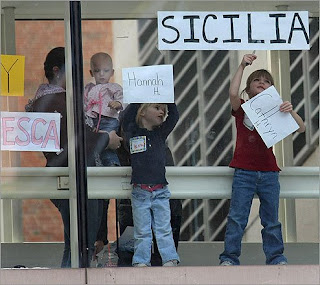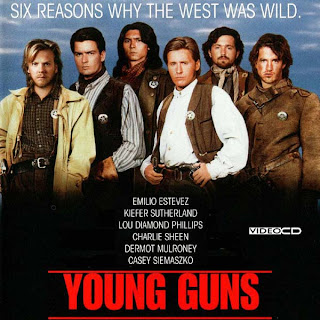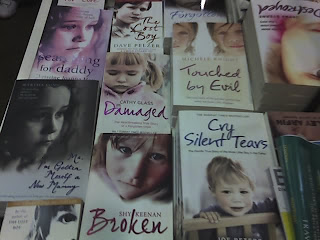Category: Pictures Page 26 of 46
 I am both startled and pleased to report that today is World Book Day 2009 (the former reaction because it hardly seems a year since the last one, and the latter because it’s good thing).
I am both startled and pleased to report that today is World Book Day 2009 (the former reaction because it hardly seems a year since the last one, and the latter because it’s good thing).
As with last year, £1 book tokens are given to large numbers of schoolchildren, and a selection of £1 books are made available in bookshops. I’m sure you can see how those two events can be made to interweave happily.
It’s not just about young readers, though – a number of Quickreads, short books priced at £1.99 and aimed at occasional or learning adult readers will be published today, featuring popular writers and characters, in the hope of encouraging more people to read.
So, if you know someone who’s been given a £1 book token, or someone who doesn’t read books very often (a habit a lot of people seem to take pride in, much to my bewilderment), why not encourage them to try one of the WBD books? Or even buy one for them as a pressie.
It could cost less than a cup of coffee, is less likely to end up in the toilet (I hope), and could start, or re-kindle, an appreciation of the written word.
(I have no connection with WBD or any of the authors or publishers involved – I just think it’s a really good idea, and want to alert people to the event.)

 In about 1994, I visited a friend of mine who was studying at Cambridge University. Whilst I was there, we went to visit a friend of hers who was having a kind of open afternoon thing, and tea and toast were being served (pretty much the staple of student life, and all too often the culinary accompaniment to late-night discussions about the state of the world).
In about 1994, I visited a friend of mine who was studying at Cambridge University. Whilst I was there, we went to visit a friend of hers who was having a kind of open afternoon thing, and tea and toast were being served (pretty much the staple of student life, and all too often the culinary accompaniment to late-night discussions about the state of the world).
There were some people there I hadn’t met before, and one of them was involved with Cambridge’s Tibet Support Group. As I’ve probably mentioned before, I’m interested in this issue, and when she mentioned that the Dalai Lama had visited to speak to them a few months previously, I asked what he was like.
“Hmm,” she said, and paused. Would she say he had a certain presence, I wondered? That he radiated a kind of indefinable warmth and compassion? That, despite everything he and fellow Tibetans have suffered, he was all smiles and laughter?
“He’s quite fat,” she said eventually. Hmph, thought I. Not quite what I was expecting, but undeterred, I launched into a frankly gripping anecdote from the news a couple of years prior to that date, which involved a student travelling in Tibet and being received very favourably by the local people because he was wearing a T-shirt featuring Phil Silvers (above, star of Sgt Bilko), and the Tibetans mistook it for a representation of the Dalai Lama (also above). But as I regaled the crowd with my tale, I was being met with slightly blank looks, as opposed to the nods and semi-smiles I was expecting as I approached the punchline (well, explanation). And suddenly I realised why.
Oh God, it dawned on me. They don’t know who Phil Silvers is.
Now, I wish I could pretend that this (true) story is being presented by way of demonstrating that my intelligence was superior to everyone in the room that day, but that’s almost certainly not the case, and so it’s not why I’m writing about it; what I’ve always felt it does demonstrate, though, is that there are often fairly major differences between academic ability and intelligence or general knowledge.
It’s not a new insight by any means – I’m sure we’ve all met people who seem to have a veritable alphabetti spaghetti of initials after their name on their business card, but seem to lack the basic social skills to go into a restaurant and order, for example, a plate of spaghetti. As the old saying goes, there are many things you don’t get from ‘book-learnin’, and anyway, the entry requirements for the University of Life are slightly less stringent, especially if you’re an old boy (or girl) of the School of Hard Knocks.
Anyway, all this is a typically Soanesian build-up to a current news story, the fact that the recent winners of the BBC quiz show University Challenge have had their victory withdrawn. One of the winning Oxford Corpus Christi team turned out not to be a student by the time they reached the final, and this is one of the entry requirements (and there now appears to be a suggestion that previous winners may have broken this rule as well).
Now, there’s some justifiable debate about whether Granada, the programme’s makers, have made this rule harder to comply with as their shooting schedule no longer correlates with the academic year (meaning you could be a member of a college in the opening rounds but have left by the time the team got, say, to the semi-finals), but the fact that attention’s now being paid to the practicalities of the way the show is made should also mean that people should also spot the reason why Oxford’s team screwed up, and made a mistake which led to the loss of the title: they could have asked a member of the production team if they were still okay to field the team member in question.
But they didn’t ask this simple question – and if they had asked and been told no, all teams (as I understand it) have a reserve team member, and so that’s who should have filled the chair. Instead, they don’t appear to have asked, and this simple mistake – I’d say schoolboy error – led to their disqualification.
If you’re not sure if you’re allowed to do something, or that you might not be doing it correctly, the best way to find out is to ask someone who knows. If you don’t ask, you could get into trouble further down the line, and it might also look slightly arrogant, as if you don’t care if the rules apply to you. Social skills and general worldly ability can often be rather over-rated, but even if you want to become a hardcore academic, it’s probably a good idea to learn how to deal with people, in case you have to deal with them when you’re trying to, for example, get a publisher to turn your PhD thesis into a book. Knowing absolutely everything ever is of pretty limited use if you can’t get people to listen to you in the first place because you’re rude or otherwise socially lacking.
Incidentally, I’ve only recently become a regular viewer of University Challenge for the simple reason that it’s fun to shout out the answers at home, and it has – in comparison with many other TV quiz shows – a lot of questions; most of them seem keen to pad the proceedings out with bursts of music or lighting effects or pre-scripted insults or other weak links, but UC just has loads of questions, on a good spread of subjects (it’s not all questions about Juvenal, some of the topics are pretty juvenile).
It’s just unfortunate that, in relation to the issue of eligibility, not one member of this year’s Corpus Christi team was willing to ask a question.
 Staying in hotels is, of course, one of life’s great delights; as well as televisions with fewer channels than one can watch at home, and showers which have two extremes of temperature (Inferno and Arctic) and nothing in between, there’s always the thrill of using the ‘tea and coffee making facilities’.
Staying in hotels is, of course, one of life’s great delights; as well as televisions with fewer channels than one can watch at home, and showers which have two extremes of temperature (Inferno and Arctic) and nothing in between, there’s always the thrill of using the ‘tea and coffee making facilities’.
If the room has a fridge, you might have some real milk, so you can make a proper cuppa, but more often than not, you’re likely to have a kettle, cups, teabags, and, in some form or other, UHT milk. UHT milk is obviously handy for hotel-owners, as it lasts for ages (decades after we humans are dust and gone, the giant radioactive cockroaches will still be finding stashes of it and drinking it in an attempt to fend off Causium-234-induced osteoporosis), but it doesn’t taste very good at all… by which I mean it tastes of virtually nothing at all, being more like a homeopathic version of Tipp-Ex than milk.
Anyway, UHT milk used to be supplied in hotel rooms (and on trains and service stations and other strangely neither-here-nor-there places) in little pots, like miniaturised yogurt pots, with a foil lid; as Ben Elton noted in the 1980s, these pots appeared to have been spot-welded shut, so it was a battle to get them open, invariably resulting in you showering what little ‘milk’ lurked within all over the place. And Ben was right to point this out, but the so-called solution is no better, quite frankly: ladies and gents, the milk processing people and hospitality industry proudly present (while the rest of us just resent)… Dairystix.
Yes, all the lack of flavour of UHT milk, now in a longer-than-it-is-wide foil tube. Apparently taking their design cue from those Mr Freeze ice pops which can be found in the Walls freezers in newsagents in summer, the idea is that you tear the end off the ‘stick and then pour the milk (well, it’s UHT, so I use the term in its loosest and least-accurate sense) into the cup. Which would be fine, if the ends actually tore off in anything approximating a straight line. But that’s not likely to happen with the ‘dotted lines’ you have to tear along, because they’re coated with plastic and so you get an untidy tear along it. Which, when you squeeze the tube, means the milk comes out of two or three places in the end of the tube, like a man trying to urinate after someone’s stapled the end of his prepuce (if that comparison appalls you, you may want to stop reading now – there’s worse to come before this rant is over).
The reward for all this is a pathetic splash of not-milk, which barely coats the bottom of most cups. So you have to put two in, though you’ll be lucky in most hotels to get more than two of the sticks per person, so you’ll have to think carefully about when you drink your tea. And even then two isn’t really enough to make it look like tea. And the reason for this is pretty pathetic; these milk sticks, like the milk pots before them, contain a minimal amount of milk.
In fact, I’m such a sad pedant that I actually did a bit of research to try and find out just how much (or, rather, how little) UHT milk is contained in a DairyStix. Appallingly, it is 12ml, or about 4% of a can of Diet Coke. So, all that effort wrestling with the end of it and then you squeeze down the length of it several times over, resulting in a spray in unexpected directions? All of which is – frankly – little more than the overall quantity of the average male ejaculation (where do you think the group 10cc got their name)? Perhaps it’s in some way connected with the choice of films on the in-room TV.
Anyway, my friends, as something that doesn’t work and yet looks quite modern and flashy, this is a pretty classic example of Unintelligent Design. Yes, perhaps I love my tea a bit too much, but it seems that the makers of DairyStix and similar items treat the making of tea and coffee with a little bit less love than they should, given that it’s part of how they make their living.
 Amidst all the cynicism and nastiness of the blog – er, I mean world, it’s easy to forget that people can often be disarmingly kind. It doesn’t always take much effort, or even expenditure, to be nice when you could be nasty, though that’s all too often overlooked as the news media bombard you with tales of financial and social woe.
Amidst all the cynicism and nastiness of the blog – er, I mean world, it’s easy to forget that people can often be disarmingly kind. It doesn’t always take much effort, or even expenditure, to be nice when you could be nasty, though that’s all too often overlooked as the news media bombard you with tales of financial and social woe.
So, in the hope that it might make you feel – as I did – that the world isn’t an inherently hostile place, I would urge you to read the story (and play the video) behind the picture accompanying this post; the words and moving images can both be found here.
And if you don’t think it’s a good thing, then I say Fie and call you a callous savage, for kindness and consideration are all that set us apart from the animals!
…Well, that and using utensils instead of our teeth to cut up our food, but you know what I mean.









